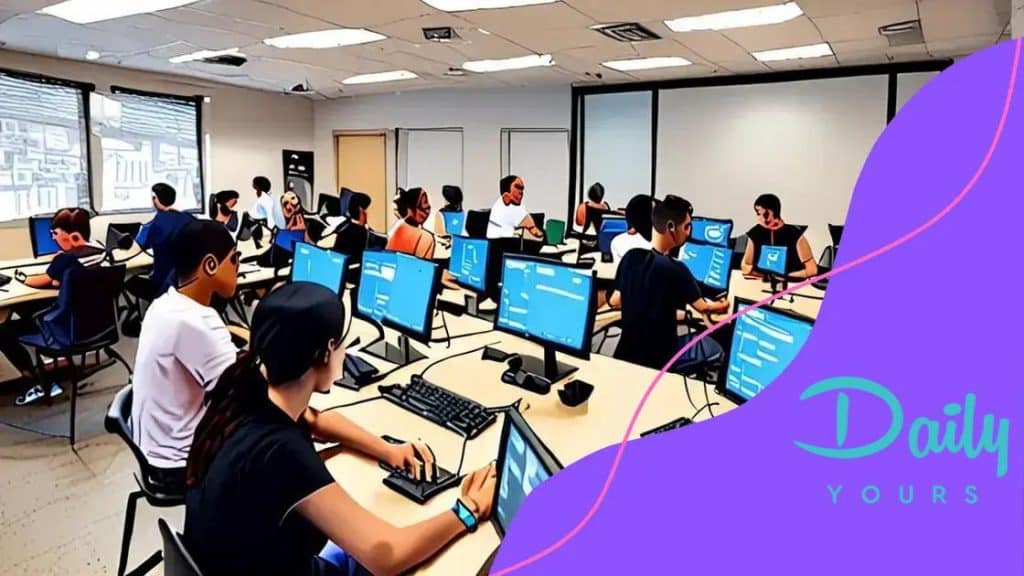Increasing demand for coding bootcamps over traditional degrees

Anúncios
Increasing demand for coding bootcamps over traditional degrees reflects a shift towards practical, skills-focused education that prepares students for immediate employment in the tech industry.
Increasing demand for coding bootcamps over traditional degrees highlights a significant shift in how we view education today. Many individuals are questioning the value of a four-year degree in favor of faster, more focused training in tech fields. Have you considered how this change might impact your career?
Anúncios
The rise of coding bootcamps
The rise of coding bootcamps has transformed the landscape of education in technology. As traditional degree programs often take years to complete, many are seeking faster and more relevant ways to enter the tech workforce.
Why Coding Bootcamps are Popular
One major reason for their popularity is the demand for specific skills that employers are looking for. Bootcamps focus on practical, hands-on training rather than theory, making graduates job-ready in a short time. Many aspiring developers appreciate the ability to build a portfolio of work in just a few months.
- Short duration—most ran between 8 to 24 weeks.
- Hands-on experience with real projects.
- Networking opportunities within the tech industry.
Furthermore, coding bootcamps foster a collaborative environment where learners can share ideas and techniques with peers. This approach not only enhances learning but also mirrors the teamwork often required in tech jobs today. Many bootcamps also offer job placement assistance, which further accelerates graduates’ pathways into employment.
Anúncios
Flexibility and Accessibility
Online coding bootcamps have made this form of education accessible to more people. With schedules that accommodate working students, individuals can learn at their own pace. The flexibility appeals to those who might not have the ability to attend a traditional college full-time.
According to recent studies, bootcamp graduates have found jobs in various roles, from software development to UX design. The increasing number of success stories emphasizes the effectiveness of bootcamps as a viable educational option.
Ultimately, the rise of coding bootcamps reflects a significant shift in how we think about education in technology. With their focus on skills and job readiness, they provide opportunities for many who might otherwise find traditional degree paths daunting.
How bootcamps compare to traditional degrees
Understanding how bootcamps compare to traditional degrees helps prospective students make informed choices. While traditional degrees offer comprehensive education, bootcamps provide a focused and accelerated approach to learning.
Time Commitment
One significant difference is the duration of study. Traditional degree programs typically require four years to complete. In contrast, coding bootcamps often take just a few months. This rapid pace allows students to immerse themselves in coding and start working sooner.
- Bootcamps range from 8 to 24 weeks.
- Degrees require extensive coursework and electives.
- Bootcamps usually focus on specific skills and technologies.
This efficiency appeals to many students who are eager to enter the job market quickly. Additionally, bootcamps are designed to adapt to changing industry demands, ensuring that students learn relevant skills that employers are actively seeking.
Cost Considerations
Another key factor is the cost. Traditional degrees can be expensive, often leading to student debt. Bootcamps usually have a lower upfront cost, making them accessible to a wider audience. Many bootcamps even offer payment plans or income share agreements, which allow students to pay once they secure a job.
While bootcamps emphasize practical skills, traditional degrees provide a broader academic foundation. This can be advantageous for students seeking careers in highly technical areas or roles that require deeper theoretical knowledge.
However, the job market shows there’s a high demand for technical skills, boosting the attractiveness of bootcamp graduates. Many tech companies now prioritize skills over educational backgrounds, making bootcamps a valid entrance point into the industry.
As individuals weigh their options, it’s essential to consider their career goals and learning preferences. Both paths have unique benefits, allowing students to choose what best fits their aspirations.
Skills employers seek from graduates

When considering career options, it’s crucial to understand the skills employers seek from graduates of coding bootcamps. These skills often set bootcamp graduates apart from those with traditional degrees.
Technical Skills
First, employers look for solid technical skills. This includes proficiency in programming languages like JavaScript, Python, and Ruby. Knowledge of frameworks such as React or Angular can be equally important. Mastery of coding fundamentals allows graduates to tackle real-world problems effectively.
- Proficiency in multiple programming languages.
- Experience with version control systems like Git.
- Understanding of web development principles.
In addition to technical skills, being familiar with databases and APIs can give candidates an edge in interviews. Employers seek individuals who can use these tools to enhance software functionality.
Soft Skills
While technical abilities are vital, employers increasingly value soft skills as well. Communication and teamwork are critical in tech environments. Graduates should be able to articulate ideas clearly and work collaboratively with diverse teams. Problem-solving skills are also essential, as they help graduates navigate challenges effectively.
Moreover, adaptability is highly sought after in the fast-paced tech industry. The ability to learn new technologies and adjust to changes can significantly impact job performance. Employers want graduates who can thrive in dynamic settings and contribute positively to team efforts.
As companies prioritize skills over educational backgrounds, focus on developing both technical and soft skills. This combination will enhance a graduate’s employability and prepare them for future challenges in the tech landscape.
Success stories from bootcamp alumni
Success stories from bootcamp alumni highlight the positive impact of these programs on individuals looking to enter the tech industry. Many graduates have transformed their careers in a short time, illustrating the potential of this educational path.
Career Transitions
For instance, several alumni come from non-technical backgrounds. One graduate, previously a teacher, learned to code at a bootcamp and now works as a software engineer. This shift shows that anyone can pivot careers with the right training and dedication. Many bootcamps equip students with the essential skills to tackle real-world challenges.
- Graduates often find jobs within three to six months.
- Companies actively seek employees who have completed boot camps.
- Alumni frequently double or triple their previous salaries.
Success stories frequently feature graduates who quickly became part of reputable tech firms. These positions often allow alumni to work on significant projects that shape the tech landscape.
Building a Network
Another key factor in the success of bootcamp alumni is the strong network they build. Many bootcamps emphasize collaboration and community, allowing graduates to connect with peers and industry professionals. This network often opens doors to job opportunities that might not be accessible through traditional channels. Events such as hackathons and meetups further facilitate these connections.
Many alumni share their experiences online, contributing to blogs and social media, inspiring future students. Their stories not only highlight personal success but also emphasize the changing perception of bootcamps.
Bootcamp graduates are increasingly recognized as valuable assets in the tech field. Their unique blend of skills and practical experience prepares them for the challenges of the industry. As more success stories circulate, the stigma of non-traditional education diminishes, encouraging more individuals to explore coding bootcamps as viable options.
Future of coding education
The future of coding education is evolving rapidly, driven by technology and industry demands. As the tech landscape changes, so do the educational methods aimed at preparing students for careers in this field.
Emerging Trends
One major trend is the increasing popularity of online learning platforms. These platforms offer flexibility, allowing students to learn at their own pace. Many bootcamps and institutions are now providing remote courses, making quality education accessible to a larger audience.
- Interactive and immersive learning experiences are on the rise.
- Micro-credentialing is becoming more common for validating specific skills.
- Partnerships between technology companies and educational institutions are increasing.
These partnerships often lead to curriculum that is directly aligned with industry needs, providing students with relevant skills. Industry professionals are contributing to course design, ensuring that graduates are well-equipped for the job market.
AI and Adaptive Learning
Artificial Intelligence (AI) is also playing a significant role in shaping the future of coding education. Adaptive learning technologies can tailor educational experiences to fit individual student needs. This personalized approach can help learners grasp complex concepts more effectively by adjusting the difficulty level based on their progress.
Moreover, coding education is integrating real-world projects and hands-on experiences. Students are encouraged to work on actual coding tasks that reflect industry standards. This practical application solidifies their understanding and prepares them for jobs in technology.
As more students enter the field through alternative pathways, traditional education systems are also adapting. Schools and universities are exploring hybrid models that combine online and in-person learning, offering a balanced approach that meets various student needs.
The evolution of coding education indicates a promising future for aspiring developers. With continuous innovation and a focus on skill acquisition, the barriers to entry into tech careers are lower than ever, inviting more individuals to explore opportunities in this thriving industry.
FAQ – Frequently Asked Questions about Coding Bootcamps and Education
What are coding bootcamps?
Coding bootcamps are short, intensive training programs that teach specific programming skills quickly, often in a few months.
How do bootcamps compare to traditional degrees?
Bootcamps are typically shorter and more focused on practical skills, while traditional degrees offer a broader academic foundation.
What skills do employers value from bootcamp graduates?
Employers look for technical skills in programming, along with soft skills like communication and teamwork.
Is coding education accessible for everyone?
Yes, coding bootcamps and online platforms have made education in programming more accessible to a wide audience.





